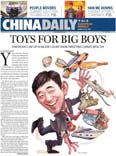Economy
China to put brakes on its economic bullet train
Updated: 2011-04-19 10:05
(Xinhua)
BEIJING - Just as it lowered the speed of its Beijing-Shanghai bullet train to ensure safety and affordability, China is trying to slow down its rapid economic growth to encourage sustainability over the next five years.
The government's efforts can be seen in economic data from the first quarter of 2011, or the start of China's 12th five-year development plan. China's economy expanded by 9.7 percent in the first quarter, tapering slightly from the 9.8 percent growth posted in the fourth quarter of last year, according to economic data released last week.
Sheng Laiyun, a spokesman from the National Bureau of Statistics, called the performance a sign of "steady growth" and "a good beginning."
China also saw a trade deficit of $1.02 billion from January to March this year, the first quarterly trade deficit in six years.
Furthermore, private investment rose 31.5 percent year-on-year in the first quarter, 6.5 percentage points higher than the overall investment growth rate.
Analysts said this data indicates that China's domestic consumption is picking up. Stimulating domestic consumption is just one of the tasks outlined in the government's five-year economic blueprint.
Economic data from the first quarter points to steady and balanced growth, which is in line with the government's goal of transforming the country's development mode, said Zuo Xiaolei, chief economist at China Galaxy Securities.
After relying on exports and government investments to fuel its economic growth for decades, China is taking steps to restructure its economy by emphasizing a domestically-driven, consumption-based system. This model promises more sustainable development, according to government officials and economists.
The biggest challenge China faces in the next five years is balancing investment and consumption, said Paul Sheard, global chief economist of Nomura Securities.
China's 12th Five-Year Plan, adopted in March, provides a rough road map for the country to follow. It outlines a series of policies and priorities which will support the evolution of China's economy over the next five years and beyond. The plan calls for lowering economic growth to 7 percent annually in exchange for greater sustainability and an improved quality of life for China's citizens.
Chinese President Hu Jintao said in a speech on April 15 at the Boao Forum for Asia (BFA), a non-governmental economic forum, that population, resources and the environment have put great pressure on China's economic and social development, and that there is lack of balance, coordination and sustainability in China's current development mode.
Hu said China will boost domestic demand over the next five years and put an effective mechanism in place to unleash consumption potential. Furthermore, the country will boost imports as part of its efforts to restructure its economy, he said.
"We will ensure that consumption, investment and export contribute to economic growth in a coordinated way," Hu said.
The key to stimulating domestic demand is to increase household income, which will promote consumption and encourage sustainable economic growth, said Xu Fengliang, senior researcher with the Chinese Academy of Social Sciences, a government think tank.
The new five-year plan aims to spread more wealth among China's 1.3 billion people, as a way of fostering domestic growth and creating a new driver for future economic expansion, said Chi Fulin, executive director of the China (Hainan) Institute for Reform and Development.
Since last year, 30 provinces and regions have raised minimum wages. In addition, China is likely to raise its threshold for individual income tax to between 2,500 and 3,000 yuan per month from the current 2,000 yuan, the China Business News reported, citing a source close to China's tax regulating body. The government may also cut the number of income tax brackets from nine down to five, according to the report.
"Only when people have their pockets full can economic development achieve sustainable momentum," said Zhang Yansheng, director of the National Development and Reform Commission's Research Institute of Foreign Economic Relations.
E-paper

Han me downs
Traditional 3,000-year-old clothes are making a comeback.
Reaching out
Fast growth fuels rise in super rich
Chinese tourists spend more
Specials

Big spenders
More mainland tourists are expected to spend money on overseas travel this year.

Rise in super rich
Report cites rising property prices, gdp as key drivers of increasing number of chinese millionaires.

Reaching out
Condom makers are stepping up their presence in smaller cities to boost sales




